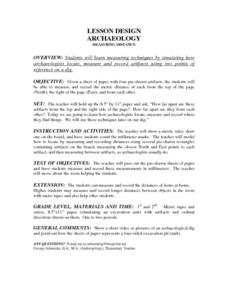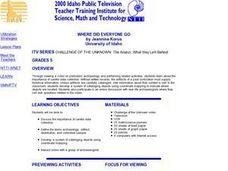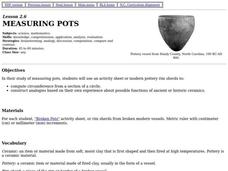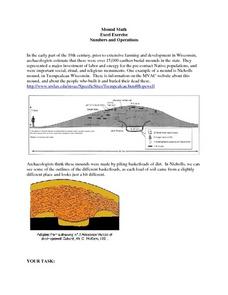Curated OER
The Mathematician And The Archaeologist
Students decorate clay pots and destroy them in order to learn the techniques of modern-day archaeologists and practice mathematical measurements. This is an exciting lesson suitable for Social Studies, Math, Science, or Art classroom.
Curated OER
Dr. Dirt's Archaeology Lab Artifact Analysis
Students simulate analyzing artifacts in archaeological lab by using real techniques that archaeologists use. Students practice measuring skills, drawing, writing, and brainstorming, and make inferences based on evidence.
Curated OER
Archaeology: Digging in the Classroom
Learners explore how an archaeologist works and makes discoveries. In this archaeology lesson, students participate in a simulation in which they excavate broken pottery. Learners use measurement, geometry, and observation skills during...
Curated OER
Lesson Design Archaeology- Measuring Distance
Students measure and write specific metric distances. In this archaeology lesson, students are given specific artifact locations on a map and measure the distance using millimeters.
Curated OER
Where Did Everyone Go?
Fifth graders view a video, and perform related activities on prehistoric archaeology to gain an understanding about the importance of careful data collection. They develop a system of cataloging objects using coordinate mapping to...
Curated OER
Discovering Pi
Students investigate the math concept of Pi (specifically, what pi is, the significance and how it is used in the real world). This is a hands on lesson in which the students actively participate with their investigations.
The...
Curated OER
What did I find?
Students excavate an artifact. In this archaeology lesson, students get a bucket filled with dirt and a broken up artifact. They work in groups to take it out and to find what its purpose was.
Curated OER
Measuring Pots
Students use an activity sheet to construct analogies about possible function of ancient or historic ceramics and compute circumference from a section of a circle as they study measuring pots.
Curated OER
"How to Think Like an Archaeologist" - Suggested Pre-Visit Activity For Historic Jamestown
Learners examine how archaeologists use artifacts to explore other people and their cultures. They discuss types of artifacts, analyze receipts for clues, and discuss how what the items bought reflect about people.
Curated OER
Lesson plan: History Underfoot
Students study Native Americans of Virginia. In this Virginia history lesson, students take on the role of archaeologists as they analyze a site and its artifacts. Students use the information to draw conclusions about the natives who...
Curated OER
Coordinate Grid: Mapping an Archaeological Site
Middle schoolers examine how archaeologists preserve context of sites through use of rectangular grid or Cartesian coordinate system, and develop sense of distance by pacing off and estimating distances.
Curated OER
Mapping with a Compass: A Simulated Survey
Students use compasses and grids to map the locations of artifacts found in a simulated dig site. In groups, they role-play as future archeologists excavating a school site. Groups begin at their assigned datum and site the artifacts...
Curated OER
Introduction to Archaeology
Students view a PowerPoint presentation called, Archaeological Terms then discuss the job of an archaeologist and new vocabulary. They view the teacher made "artifact grid" and photograph the grid from different angles. They work in...
Curated OER
Mapping a Site Using a Coordinate Plane
Learners map their playground as if it were an archeological site. They locate objects on the playground and determine their location using coordinate points. A related lesson is Coordinate Grid: Mapping an Archeological Site.
Curated OER
How To Think Like An Archaeologist
Students take a field trip to historical Jamestown. Using artifacts given to them, they must identify them and discover who would have used them and for what purpose. They create a database to organize the information and share it with...
Curated OER
"how To Think Like an Archaeologist" Suggested Pre-visit Activity for Historic Jamestowne
Young scholars study grocery receipts to simulate the archaeological activity of classifying items. They discuss the receipts as if they were find lists.
Curated OER
Mound Math
Middle schoolers examine the many different burial mounds in Wisconsin. In groups, they use the internet to discover how long it took to build a specific mound. They must calculate the measurements of the mound to make a scale model.
Curated OER
Mapping and Excavating a Jello Mold
Fifth graders, in groups, map the three layers of different colored jello layers in molds and note the placement of fruit in them. On the grid paper they draw each grape, raisin, or other object and carefully remove each layer. After...
Curated OER
"Adding It Up" at James Fort
Students discuss jettons and their archaeological importance at Jamestown. They then practice using historic counting sheets and artifacts to understand the calculating methods of the early 17th Century, and identify their similarities...
Curated OER
Primary Sources and Archaeology in the Study of Ancient Mediterranean Trade
Tenth graders begin the lesson by plotting trade routes, major empires and items traded. Using primary sources, they examine their own values regarding trading items for royality. They participate in a role-play exercise in which they...
Curated OER
The Demise of Copper's Trading Power
Eighth graders evaluate statistical equations. They examine data from archaeologists at Jamestown, complete statistical equations using the sets of data, and graph the results.
Curated OER
Functions and Graphs -- Pattern Detection #1
Young scholars discuss the job of an archaeologist by determining how people have used their environment. Using a graph, they analyze the patterns and functions of Native Americans in Arizona using maize. They work together to answer...
Curated OER
"it's All in the Cellar"
Seventh graders examine the process of constructing a site plan map at archaeological sites. They discuss the process of mapping techniques and calculation of percentages, create a plan site map of a cellar at Jamestown, and calculate...
Curated OER
Investigating the Mammoth Mystery
Fourth graders go on a virtual dig to find out where the mammoth bones found in a rural U.S. county came from. They determine whether the bones were created by humans or were they the actual remains of mammoths who walked the area during...























